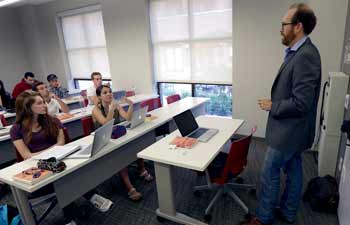Teaching to Learn
In 1905, Woodrow Wilson, then president of Princeton University, introduced the preceptorial method — a style of learning wherein small groups of students meet regularly with a faculty member for more intimate learning and discussion.
More than a century later, USC Dornsife is modernizing this concept to benefit its recent Ph.D. graduates who are faced with an increasingly competitive job market, particularly those in the humanities and social sciences.
“In the humanities the job market has gotten much tighter,” said Alex Young, who received his doctorate in English from USC Dornsife this summer. “More and more the model is for humanities scholars to spend two or three years in a postdoc position before taking a tenure-track position.”
In response to this trend, the Office of Academic Programs in the USC Dornsife Dean’s Office has developed the Dornsife Preceptor Program, which offers full-time, salaried preceptor positions to recent doctoral graduates of USC. For the inaugural year of the program, six positions were offered — three in the humanities and three in the social sciences.
A renewed focus on teaching
The program also responds to a dialogue taking place across academia related to teaching, said Steven Lamy, vice dean for academic programs and professor of international relations. There has been a sense of dissatisfaction with research universities around a perceived lack of attention to teaching, which is why cultivating preceptor opportunities such as these benefits both USC and its students.
The Dornsife Preceptor Program aims to provide preceptors with direct teaching experience that will ultimately lead to a tenure-track position at another university. It creates meaningful teaching experience for Ph.D. graduates that makes them more marketable both to other research universities and high-end liberal arts colleges where teaching is paramount.
In addition to leading four discussion sections as a teaching assistant for a class in the undergraduate general education program, preceptors get to design their own syllabus for a course that relates to their area of expertise.
Preceptors also have the opportunity to receive mentorship from the faculty member teaching the general education course. Preceptors can ask questions and get helpful feedback about their self-designed courses. The job also provides time for refining personal research with the goal of publication, further strengthening their portfolios as they search for tenure-track positions.
Filling a gap for recent graduates
Young, one of this year’s preceptors, was drawn to the opportunity to remain at USC, he said, and teach students of a high caliber. Already an award-winning researcher, he wants to continue his career as a humanities scholar and is looking for tenure-track jobs in American studies or English.
“[The program] fills the gap that’s getting increasingly hard to fill between completing a Ph.D. and successfully finding a tenure-track job. This gives me an opportunity not only to build my teaching profile but to continue to build my research profile in ways that will assist me as I continue my search.”

Preceptor Alex Young teaches a general education seminar he designed called “Representing the Global War on Terror.”
As a teaching assistant, Young is working with Tim Gustafson, associate professor of English and American studies and ethnicity, for his “Los Angeles: The City, the Novel, the Film” class. The seminar Young conceived is called “Representing the Global War on Terror,” one of the new first-year general education seminars.
“I’ve been interested in how film and literature represent the war on terror. My class allows us to think about how society uses narratives to work through some of the intractable problems that have defined the conflict thus far.”
Practitioners in the classroom
Míchel Angela Martinez, another preceptor, received her Ph.D. in political science, social justice movements and visual culture from USC Dornsife earlier this year. Between her undergraduate and doctoral studies at USC, she worked for three years doing legal organizing work for the New York City-based National Lawyers Guild.
At core an activist and photographer, her work has focused on local to international efforts concerning prisons, policing, poverty, abuse of animals and the environment, capital punishment, torture, workers’ rights, gender inequality and free speech.
As a teaching assistant for the general education class “Law, Politics and Public Policy,” Martinez tries to expose students to matters that center more on social justice. She also designed the upper-level seminar “Activism and Organizing” in the political science department, which she called her “dream course.”
“While many postdocs are research-based, I’m most interested in giving the students the activist and organizing advising they need. I bring a different experience that’s focused on people working together, teaching one another and sharing information. I see teaching as part of my activist work.”
Lamy said that some of the preceptors are already proposing new kinds of summer courses.
“Everyone benefits from this, both the teachers and students. We’ve tried to put the preceptors in classes where they can really develop their professional skills as well as design their own courses, which they can use in the job market as an example of what they can teach.
“I think our undergraduates are benefitting from some really smart people who care about students,” he said.